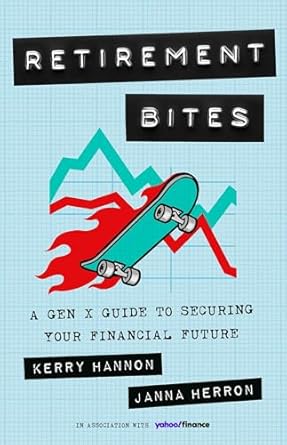The following is an excerpt from the forthcoming book “Retirement Bites: A Gen X Guide to Securing Your Financial Future,” by Kerry Hannon and Janna Herron.
Are you freaking out about retirement?
That’s what many Gen Xers may be feeling. The oldest of the generation have reached that magical age of 59½ when you can dip into retirement accounts without getting dinged by an early withdrawal penalty. The youngest Gen Xers have another 20 years to go before they become eligible for Medicare. That’s not as far away as you might think.
But you’re probably still busy thinking about all the other responsibilities coming down the pike, like paying for your kids’ college or caring for your aging parents. So maybe saving enough for a comfortable retirement of your own has taken a back seat. Or maybe you feel like you’re only slightly behind—there’s still time, right? Or maybe, just maybe, you’re up late with a calculator and a 401(k) statement, not sure how to make it all make sense.
You’re not alone.
1 in 4 Gen Xers don’t have a retirement account at all, while the typical household for the generation has just $40,000 in retirement savings.
More than 3 in 5 Gen Xers are not confident in their ability to achieve a dream retirement, and nearly half believe they could outlive their savings.
The majority of the 64 million Americans born between 1965 and 1980 expect to postpone their retirement.
Learn more: Average savings by generation: How do you compare?
“Gen Xers have far less confidence in their financial futures than other generations,” said Kelly LaVigne, vice president of consumer insights at Allianz Life.
No kidding. But here’s the thing. Despite being tagged as slackers growing up, that’s not why many of us are behind on retirement readiness. Actually, some pretty big forces were working against us — namely, vanishing company pensions and the slow evolution of the 401(k) into “the” retirement savings vehicle.
A 2021 report found that only 14% of us have a pension plan, as more companies closed these plans to new employees. Pensions, or defined benefit retirement plans, really began to phase out in the mid-1980s when Gen X was just entering the workforce. At the same time, more employers were adding 401(k)s. Still, these 401(k)s were not the robust savings vehicles they are today. For a long time, they were largely viewed as supplemental to pensions, and Congress did not foster the growth of these plans from their inception through the mid-1990s, right when the earliest Gen Xers needed to start saving.
It wasn’t until the oldest of us were 36 — in 2001 — that Congress increased the total maximum contribution and loosened rules around the pretax cap for employee contributions. Five years later — when the youngest of us hit our mid-20s and the oldest were over 40 — Congress finally passed legislation that encouraged employers to automatically enroll workers into 401(k) plans and allowed employers to provide default investments, two efforts to increase participation as it became more obvious that the 401(k) was a main pillar for a comfy retirement.
